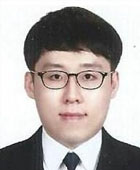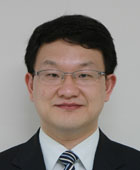
히트파이프와 공기측 핀의 자연대류를 이용한 데스크톱 PC 냉각 시스템에 관한 실험적 연구
Abstract
In this study, the forced convection electronics cooling systems in a desktop PC were replaced with a natural convection cooling system, and their cooling performance was compared experimentally. The natural convection cooling system consisted of a cooling block, cooling plate-fin assembly, and heat pipes. With this system, the operating temperature of the CPU (Central Processing Unit) was higher than that with the forced convection system owing to the lack of cooling capacity caused by the limited installation location and space. However, the properly designed natural convection cooling system for the GPU (Graphics Processing Unit) provided sufficient cooling capacity and the lower GPU operating temperature than that with forced convection under both idling and maximum calculation load conditions. The electric power consumption of the PC with the natural convection cooling system was at least 12.1% lower than that with forced convection.
Keywords:
Air cooling, Desktop PC, Fins, Heat pipe, Natural convectionAcknowledgments
본 연구는 서울과학기술대학교 교내학술연구비 지원으로 수행되었으며 이에 감사드립니다.
References
- Intel Corporation, n.d., viewed 26 Mar. 2020, IntelⓇ Core™ Processors Product Specifications, <https://ark.intel.com/content/www/us/en/ark.html#@PanelLabel122139, >.
-
Harm, H. C., Park, C. Y., 2013, Experimental Study on the Performance of an Electric Component Liquid Cooling System with Variation of the Waterblock Internal Shape, Korean J. Air-Cond. and Refrig. Eng., 25:6 331-337.
[https://doi.org/10.6110/KJACR.2013.25.6.331]

-
Hu, H. M., Ge, T. S., Dai, Y. J., Wang, R. Z., 2016, Experimental Study on Water-cooled Thermoelectric Cooler for CPU Under Severe Environment, Int. J. Refrig., 62 30-38.
[https://doi.org/10.1016/j.ijrefrig.2015.10.015]

-
Rehman, T., Ali, H. M., Saieed, A., Pao, W., Ali, M., 2018, Copper Foam/PCMs Based Heat Sinks: An Experimental Study for Electronic Cooling Systems, Int. J. Heat Mass Trans., 127 381-393.
[https://doi.org/10.1016/j.ijheatmasstransfer.2018.07.120]

-
Ribeiro, G. B., Barbosa, J. R., Prata, A. T., 2010, Mini-channel Evaporator/heat Pipe Assembly for a Chip Cooling Vapor Compression Refrigeration System, Int. J. Refrig., 33:7 1402-1412.
[https://doi.org/10.1016/j.ijrefrig.2010.05.010]

-
Tang, H., Tang, Y., Wan, Z., Li, J., Yuan, W., Lu, L., Li, Y., Tang, K., 2018, Review of Applications and Developments of Ultra-thin Micro Eat Pipes for Electronic Cooling, Applied Energy, 223 383-400.
[https://doi.org/10.1016/j.apenergy.2018.04.072]

- Wikipedia, n.d., viewed 25 Mar. 2020, Heat Pipe (image: A heat sink (aluminium) with heat pipes (copper)), <https://en.wikipedia.org/wiki/Heat_pipe, >.
- Allen Ngo, n.d., viewed 25 Mar. 2020, The MSI GT76 has an insane number of heat pipes for a laptop, <https://www.notebookcheck.net/The-MSI-GT76-has-an-insane-number-of-heat-pipes-for-a-laptop.425634.0.html, >.
-
Churchill, S. W., Chu, H. H. S., 1975, Correlating Equations for Laminar and Turbulent Free Convection from a Vertical Plate, Int. J. Heat Mass Trans., 18:11 1323-1328.
[https://doi.org/10.1016/0017-9310(75)90243-4]

- Brad Chacos, n.d., viewed 17 Apr. 2020, How-To: “Is it too hot?” Checking out CPU temperature in my PC, <http://www.itworld.co.kr/howto/108235, >.

Bachelor’s degree in the Department of Mechanical System Design Engineering, Seoul National University of Science and Technology.His research interest is experimental thermal engineering
E-mail: minbsun26@naver.com

Bachelor’s degree in the Department of Mechanical System Design Engineering, Seoul National University of Science and Technology.His research interest is experimental thermal engineering.
E-mail: joho123@seoultech.ac.kr

Bachelor’s degree in the Department of Mechanical System Design Engineering, Seoul National University of Science and Technology.Her research interest is experimental thermal engineering.
E-mail: krngw1188@naver.com

Professor in the Department of Mechanical System Design Engineering, Seoul National University of Science and Technology.His research interest is experimental thermal and fluid engineering.
E-mail: cypark@seoultech.ac.kr